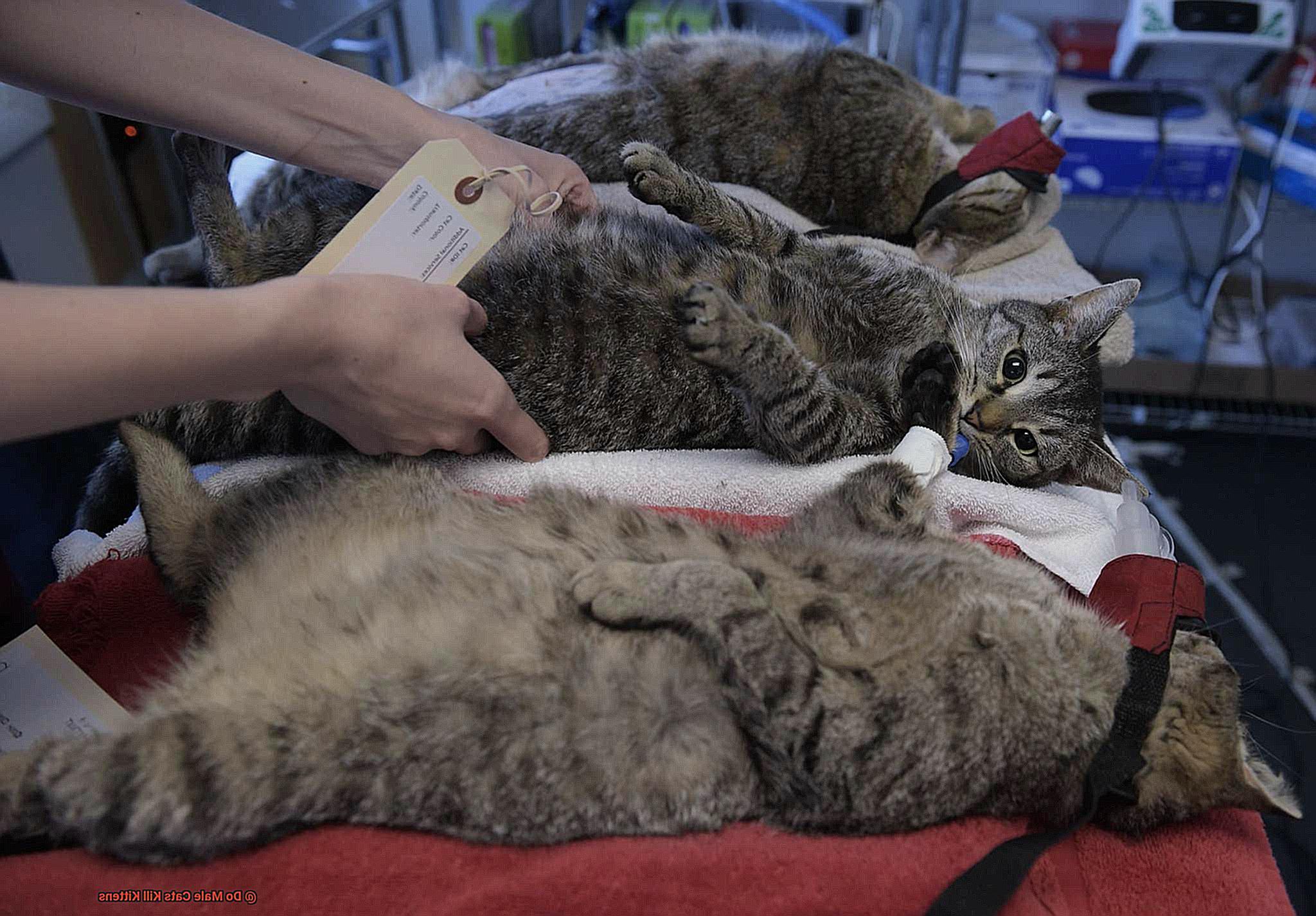When it comes to cats, there’s no denying their charm and cuteness. These feline creatures make for great companions, but what happens when a male cat encounters kittens? Does he turn into a ruthless killer? This question has been puzzling cat enthusiasts for centuries. In this blog post, we aim to dispel the myths surrounding male cats and their supposed tendency to kill kittens.
Let’s get one thing straight – male cats are not inherently evil killers of kittens. While they have a natural instinct to hunt and prey on smaller creatures, that doesn’t mean they will automatically attack kittens. In fact, male cats can be just as nurturing and protective of kittens as female cats.
In this article, we’ll delve deeper into the behavior of male cats and how they interact with kittens. We’ll explore the factors that influence their behavior towards these tiny creatures and debunk some common misconceptions about their predatory nature.
So whether you’re a devoted cat lover or simply interested in animal behavior, this post is for you. Join us as we uncover the truth about male cats and their relationship with kittens – it’s bound to be an enlightening journey.
What Causes Male Cats to Kill Kittens?
Male cats are known to have a natural instinct to hunt, and this can sometimes lead to the killing of kittens. However, it’s crucial to note that not all male cats exhibit this behavior. So, what causes male cats to kill kittens?
The primary reason behind male cats killing kittens is their hunting instinct. Male cats have a strong drive to hunt and kill prey, and unfortunately, kittens can be seen as potential prey. Male cats in the wild often kill the offspring of other males to eliminate competition for resources and ensure the survival of their own offspring.
Another factor that contributes to male cats killing kittens is stress. Changes in their environment, such as the introduction of a new kitten or a perceived threat, can cause stress in male cats, leading them to act out aggressively towards other cats, including kittens.
In addition, male cats may kill kittens if they are not familiar with them or perceive them as a threat. If a male cat is introduced to a litter of kittens that he has not been around before or senses that the mother cat is not accepting him as part of the family, he may attack.
It’s worth noting that some male cats may exhibit this behavior due to underlying medical issues or behavioral problems. If you suspect that your male cat is killing kittens, seeking advice from a veterinarian or animal behaviorist is crucial.

To prevent male cats from killing kittens, it’s essential to supervise their interactions closely and separate them if any signs of aggression are displayed. Neutering male cats can also help reduce their territorial and aggressive tendencies. Introducing a new kitten into a household with a male cat should be done gradually and under close supervision to allow both animals to adjust to each other’s presence.
In conclusion, understanding why male cats may kill kittens can help pet owners take steps to prevent this behavior from occurring. By providing proper care and supervision, cats of all genders can coexist peacefully in homes or outdoor cat colonies.

Are All Male Cats Aggressive Towards Kittens?
The answer is a bit more complex than a simple yes or no. As an expert in feline behavior, I can tell you that male cats have unique personalities that can influence their behavior towards kittens.
Age is a significant factor to consider. Younger male cats who have been socialized with kittens from an early age tend to be less aggressive towards them than older unneutered males who have never been around kittens. However, even if a male cat has been around kittens before, they may still show aggression towards them if they feel threatened or perceive the kitten as a potential threat to their territory.
Territorial instincts are another essential factor that can influence male cats’ behavior towards kittens. Male cats are known to be territorial animals and will defend their space against perceived threats. If a kitten enters their territory, the male cat may show aggression towards it as a way to protect their space.
It’s crucial to note that neutering a male cat can help reduce aggression towards kittens and other animals. Unneutered male cats are more likely to show territorial behavior and aggression towards other animals, including kittens. Neutering can help reduce these behaviors and make the male cat less likely to harm a kitten.

How to Reduce the Risk of Male Cats Killing Kittens

Male cats can exhibit territorial and aggressive behavior towards other cats, which can put your kittens in danger. But fear not, there are ways to reduce the risk of harm. Let’s explore five sub-sections on how to keep your kittens safe from male cats.
Neuter Your Male Cat
Neutering your male cat is the most effective way to reduce their aggressive behavior towards other cats. It also prevents unwanted litters, so you’re helping to control the cat population while keeping your furry friends safe.
Supervise Interactions
Supervising interactions between your cats is crucial, especially if they’re not familiar with each other. If your male cat shows signs of aggression towards kittens or other cats, separate them immediately and keep them apart until they can be reintroduced slowly and under supervision.
Provide Separate Living Spaces
Male cats need their own space to feel secure and prevent conflicts with other cats in the household. Providing separate feeding areas, litter boxes, and sleeping spaces for each cat can help reduce tension and aggression between them.
Mental and Physical Stimulation
Boredom can lead to destructive or aggressive behavior in male cats. Regular play sessions, toys, scratching posts, and access to outdoor areas where they can explore and play can redirect their energy towards non-living objects.
Seek Professional Advice

If your male cat has a history of aggressive behavior towards other cats or kittens, consider consulting with a veterinarian or animal behaviorist for additional guidance on how to manage their behavior and reduce the risk of harm towards other cats in the household.

Warning Signs That a Male Cat May Attack a Kitten
Introducing a new kitten to your household can be an exciting and joyous occasion, but it’s crucial to understand the warning signs that may indicate potential aggression from your male cat. Male cats are known for their territorial instincts, and if your cat has a history of attacking other animals, it’s essential to take extra precautions when introducing a new kitten.
The first warning sign is aggression towards other cats or animals. If your male cat displays this behavior, you may need to keep the kitten in a separate room for the first few days or weeks until both cats become more comfortable with each other’s presence.
Another warning sign is excessive territorial behavior. Signs of territorial behavior may include spraying or marking their territory, hissing, growling, or swatting at the kitten. If you notice these behaviors, try to provide each cat with separate spaces and resources to minimize competition.
Body language can also provide important warning signs. A male cat that is crouching low to the ground with his ears back and pupils dilated may be preparing to attack. Similarly, a cat that is puffing up his fur or arching his back may be displaying aggressive behavior. If you notice any of these signs, it’s best to separate the cats immediately and reintroduce them slowly.
It’s crucial to note that not all warning signs are easy to detect. Some male cats may hide their aggression until they feel threatened or provoked. As a result, always supervise interactions between your male cat and new kitten, especially during the first few weeks of their introduction.
What to Do if a Male Cat Does Attack a Kitten
I understand how distressing it can be when a male cat attacks a kitten. However, by acting quickly and calmly, you can ensure the safety of both animals. Here are the steps to take in case of an attack:
Separate the two cats immediately
Use a loud noise or water spray to startle the male cat and distract him from the kitten. Then, carefully remove the kitten from the area and assess its injuries.
Seek veterinary care
If the kitten is injured, seek veterinary care as soon as possible. Even if there are no visible injuries, it is still a good idea to have the kitten examined by a veterinarian to ensure that there are no internal injuries or trauma.
Address the root cause of the attack
Male cats may become aggressive if they feel threatened or sense that their territory is being invaded. Separate living spaces for adult male cats and kittens can help prevent future attacks. Introducing new cats slowly and gradually can also prevent territorial disputes. Providing plenty of resources such as food, water, and litter boxes can also reduce stress and conflicts.
Try scent swapping and supervised interactions
If reintroducing the animals is possible, try scent swapping and supervised interactions to help them become familiar with each other’s presence.
Rehome one of the animals if necessary
In some cases, it may not be possible for the two animals to live together peacefully. If this is the case, rehoming one of the animals may be necessary for their safety and wellbeing.
By taking these steps, you can protect both your kitten and male cat while promoting a peaceful coexistence. Remember to monitor interactions closely and take action immediately if an attack occurs. With proper prevention measures in place, the risk of an attack can be significantly reduced.
_OC9OTZXihM” >
Conclusion
In conclusion, the notion that male cats are merciless killers of kittens is nothing more than a myth. Although male cats possess an innate instinct to hunt and prey on smaller creatures, not all of them exhibit aggressive behavior towards kittens. The factors that determine their conduct towards these tiny beings include age, socialization, territorial instincts, and whether or not they have been neutered. It’s essential to closely monitor their interactions and take necessary precautions to ensure their safety.
To minimize the risk of harm, pet owners should provide separate living spaces for male cats and kittens, supervise their interactions vigilantly, neuter male cats, offer mental and physical stimulation for them, and seek professional advice if necessary. It’s also crucial to be aware of warning signs that may indicate potential aggression from male cats towards kittens.
In case of an attack by a male cat on a kitten, pet owners should immediately separate the two animals, seek veterinary care if necessary, address the underlying cause of the attack, try scent swapping and supervised interactions if possible, and rehome one of the animals if required.







